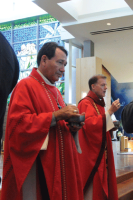H1N1 concerns prompt liturgical changes

SALT LAKE CITY – Holy water fonts will be dry, the handshake representing the sign of peace won’t be given and only the Host will be distributed at Holy Communion for the time being in the diocese.
“In order to help curb the spread of this [H1N1] virus, the Catholic Diocese of Salt Lake City will be implementing some temporary procedural changes in the liturgy,” said Bishop John C. Wester in an Oct. 15 letter addressed to the priests, deacons, religious, school principals, liturgical ministers and lay faithful. “These cautionary measures are to be implemented immediately with proper and adequate instruction/catechesis in all parishes and institutions of the diocese.”
The letter came one day after the state released data indicating that the spread of the H1N1 virus is increasing throughout Utah.
“Since the beginning of September, 127 Utahns have been hospitalized and three have died from H1N1-associated causes,” according to a Utah Department of Health press release.
Bishop Wester’s letter outlines several precautions for parishes to take against the disease. Clergy, ministers of hospitality and members of the congregation are asked not to shake hands in greeting. Also, parishioners are urged to receive Holy Communion in the hand, although the Host won’t be denied to those who choose to receive on the tongue. “If the situation worsens, this will be reviewed,” the letter states.
It continues, “[U]ntil further notice, the common Cup for Holy Communion should not be offered in the parishes, schools and institutions of the diocese,” the letter continues. While the congregation and extraordinary ministers of Holy Communion will receive only the consecrated Host, priests and deacons officially assisting at Mass will receive the Cup.
To prevent spread of the virus by contact, the handshake at the Sign of Peace will be replaced with a verbal greeting or bow, or the celebrant may omit the invitation (“Let us offer one another a Sign of Peace”); holding hands during the Our Father and the practice of touching non-communicants or children for blessing also are to be discontinued, according to the letter.
These changes will be challenging, said Timothy A. Johnston, the diocese’s director of liturgy.
“Obviously, all of these things are important to the ritual life of the church,” he said. “Holy water reminds us of our baptism. And so to remove that, there will be an absence, and hopefully there will be a feeling of loss of that sort of ritual experience. And the same with the sign of peace. We’re still going to be offering that, it just won’t be the actual handshake. We can share it verbally or by bowing to each other. But it’s an opportunity to call to mind what each of these ritual things that we do are to us or mean for us when we don’t have them. And the same thing with the cup.”
From the Middle Ages until Vatican II, the communion cup wasn’t routinely given to the people at Mass, Johnston said. “I have hope that people will miss it and kind of hunger for it, but there’s also a fear within me that it will go by the wayside again. We know across the country that there are parishes that still don’t offer the cup and there are pastors that don’t want to offer the cup because it’s a hassle. Obviously, the norm in this diocese will continue to be to offer the cup once the threat of the virus has passed. So I think what liturgically this provides is for the pastors and our lay leaders in our parishes an opportunity to talk about the importance of each of these rituals, even though we’re not going to be doing them, to re-catechize about them, especially when we’re not doing them but when we reintroduce them, to say ‘This is why this is important to our gathering and worship.’”
In his letter, Bishop Wester also instructed priests, deacons, extraordinary ministers of Holy Communion, sacristans, greeters and ushers to wash their hands with soap and water before and after the liturgy.
“In particular, those who distribute Holy Communion (at Mass, to the homebound, at hospitals, or nursing homes) should discreetly use hand sanitizers before and after Communion. This should not become part of the ritual. Boxes of tissues and additional hand sanitizers are to be provided in the gathering spaces, restrooms, kitchens or church entrances for those who wish to use them,” the letter states.
Parishioners who stay home because they’re ill are excused from the obligation of attending Mass on Sundays and Holy Days, according to the letter. “They may participate in the sacred liturgy by reading the Scriptures assigned to that Sunday and meditate on them, viewing a televised Mass, or listening to Mass on Immaculate Heart Radio,” Bishop Wester wrote.
In addition, at the recommendation of the Salt Lake Valley Health department, Bishop Wester asked that all water from holy water fonts be removed to help prevent the spread of the H1N1 virus.
© Copyright 2025 The Diocese of Salt Lake City. All rights reserved.

Stay Connected With Us